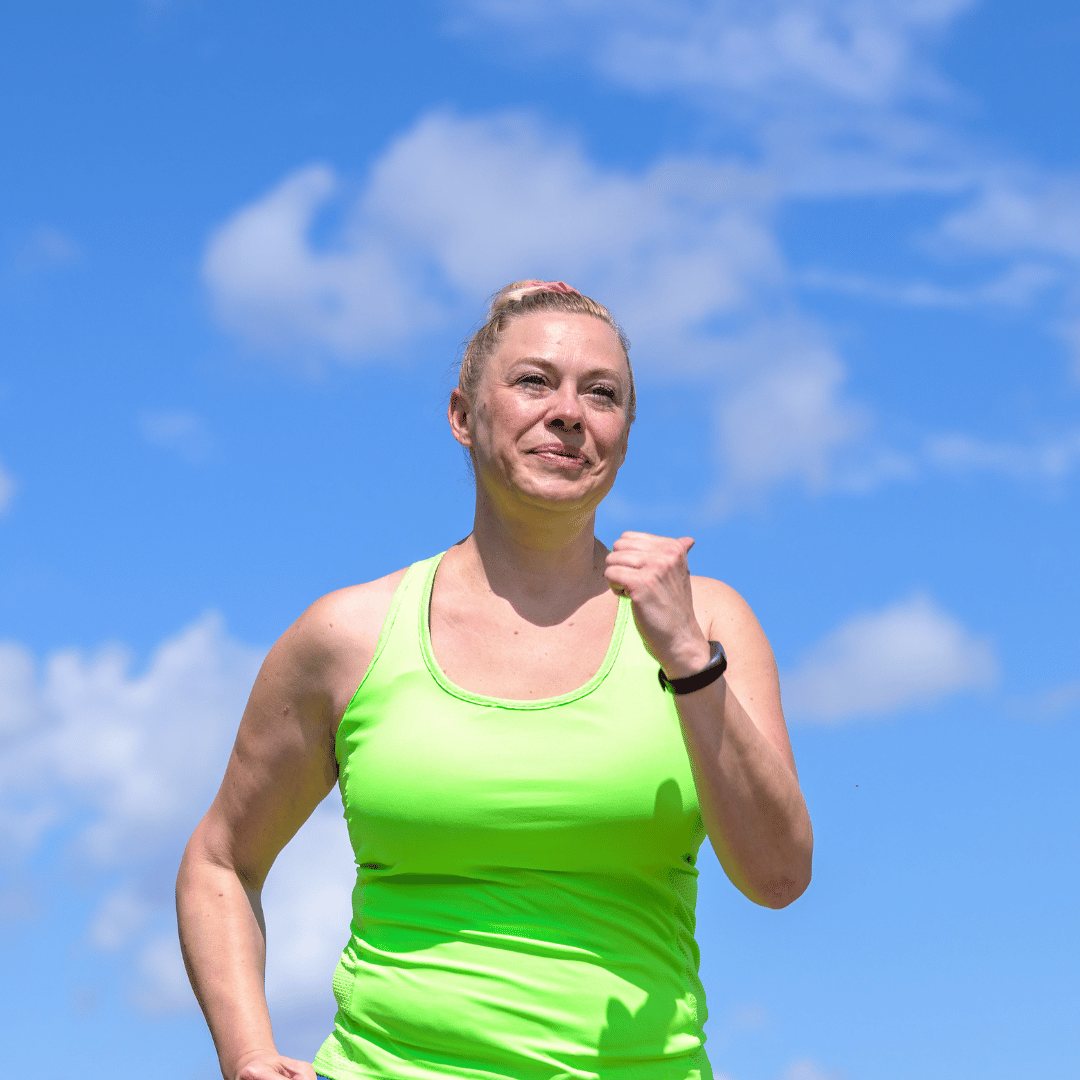
Exercise is a great perimenopause medicine
1 October 2023
Georgie Mai-Manning
Clinic Director
The important role of exercise in your perimenopause
A topic close to my heart because of my own challenges with it, and a hot topic nationally right now as we find ourselves in Menopause Awareness Month, is that of perimenopause and exercise. With more and more of our patients asking about the impact of the perimenopause on their musculoskeletal health, this seems the perfect opportunity to share my own experience and our clinical knowledge and tips for exercising well during your perimenopause. Exercise really can be your Perimenopause Medicine, but it may not take the same form at this stage of your life.
At the end of this article I also share some personal recommendations for menopause coaches and specialists – both local and virtual.
Exercise at all stages of the menopause – before, during and after your periods stop, is of huge benefit, but the perimenopause in particular is where women are first likely to struggle with the physical and emotional symptoms associated with declining and fluctuating oestrogen levels.
For many, the symptoms slowly accumulate and masquerade individually as depression, anxiety, fatigue, brain fog, joint stiffness and pain, and an increase in injuries to name but a few. As these symptoms develop over time and in a unique way for every woman, without a defining moment such as the cessation of periods, women are often in the midst of the perimenopause without a formal diagnosis. They find themselves struggling to maintain their usual lives, let alone push towards their goals and enjoy life in a way they have been used to.
For me personally, at 42 I began to notice a cluster of problems with my physical and mental health. Nothing really stood out on its own, until a conversation with another woman about the perimenopause, and I realised that the problems I was having were likely related to hormonal changes.
For me, those problems were;
- More ‘niggles’, non-specific lower back and shoulder pain
- Lack of interest and motivation for any exercise other than ‘steady state’
- Brain fog – utter blurriness after 2pm
- Being awake for 3-4 hours in the night, every night
- Anxiety and anger
- Weight gain
- Alcohol intolerance
For a couple of years I had been going around in circles, trying to find the cause for each individual issue, but knowing that they were all connected. I had no desire to exercise like I used to, so I missed out on the social interaction I needed, and as a consequence my body began to lose muscle and gain fat and I began to hate it. The brain fog made it hard to interact with people and run a business, and my frustrations, confusion and lethargy contributed to low mood and occasional bursts of utter rage.
Prior to this, exercise had always been my regulator – it was my outlet for stressful days and low mood. I offset any feelings of inadequacy I’ve always found myself prone to by setting a demanding challenge – a triathlon, a new weightlifting skill, a new personal best in the gym. I found myself unable to exercise in the same way, I was too tired to train in the morning after just a few hours of sleep, and there was no hope in hell of going anywhere to do anything in the evening.
What effects does the perimenopause have on our musculoskeletal health?
The perimenopause is the transitional phase leading up to menopause during which a woman’s body undergoes significant hormonal changes. One of the most notable hormonal changes during perimenopause involves a decline in oestrogen levels. Oestrogen is a group of female sex hormones produced primarily in the ovaries, and it plays a crucial role in regulating various aspects of a woman’s reproductive and overall health.
Oestrogen also plays a crucial role in maintaining our musculoskeletal health – the health of our bones, muscles, tendons, ligaments and connective tissues. Fluctuating and decreasing oestrogen levels during perimenopause can lead to:
- Changes in tendon structure that can cause stiffness and reduced joint flexibility. This makes tendons more susceptible to overuse injuries such as achilles or hamstring tendinopathies, or rotator cuff issues, and will also affect the ability of tendons to heal after an injury. Tendon injuries in perimenopausal women may take longer to recover, be trickier to rehabilitate, and the outcome may not be as good as with younger individuals.
- A gradual loss of muscle mass, contributing to muscle weakness and decreased physical strength. Women may find that they tire more easily during physical activities and experience reduced exercise tolerance.
- A reduction in ligament elasticity, leading to increased joint stiffness and reduced flexibility, and contributing to joint instability and an increased risk of sprains particularly in weight-bearing joints like the knees and ankles.
- A gradual loss of bone density, increasing the risk of osteoporosis and fractures.
How can exercise help during the perimenopause?
The many different forms of exercise available to us can be used as a toolkit to offset physical and emotional symptoms, reduce the risk of musculoskeletal injury, and promote better long term physical and emotional health. Whereas previously you may solely have had performance goals for your training, now might be the time to include types of exercise that can address symptoms of your perimenopause. Also, let’s not overlook the benefits of doing exercise just because you love the group of people that you’re with – the coffee and cake afterwards, the fun and banter. If your symptoms include low mood and anxiety, the power of friendship may go far further than any form of solo exercise does in reducing your symptoms.
Here are the broad types of exercise and associated benefits for your perimenopause:
Strength Training
Strength training is crucial for preventing muscle loss during perimenopause. It also helps to improve bone density, reducing the risk of stress fractures and osteoporosis. Focus on working all major muscle groups as part of a well-written plan, incorporating an appropriate level of weightlifting, bodyweight exercises, or the use of resistance bands. An exercise professional such as a personal trainer will be able to help you find what is right for you when you start, and as you progress in strength and competency. Aim to strength train 2-3 times a week.
Aerobic Exercise (cardiovascular exercise)
Aerobic exercise such as brisk walking, jogging, cycling, swimming or dancing can help improve cardiovascular health, manage weight, and boost mood. Aim for at least 150 minutes of moderate-intensity aerobic exercise per week, or 75 minutes of vigorous-intensity exercise per week, as recommended by health guidelines.
Flexibility and stretching
Stretching exercises can help maintain joint mobility and reduce the risk of muscle tightness and injury. Incorporate stretching into your routine, especially after aerobic or strength workouts. Yoga, or a dedicated stretch and mobility routine once or twice a week can also be a great stress reliever.
Balance and Stability Training
As hormone changes can affect joint stability and increase the risk of falls, balance and stability exercises are essential. Activities like tai chi and balance-focused yoga poses can help improve coordination and prevent injuries, but they can also be programmed into your strength and aerobic sessions, or as small and manageable routines throughout your day – such as balancing on leg when brushing your teeth.
Pelvic Floor Exercises
Perimenopausal women may experience changes in pelvic floor function, which can lead to issues like urinary incontinence and comfort and enjoyment of sexual intercourse. Pelvic floor exercises can help strengthen these muscles and improve symptoms.
Mind-Body Exercises
Stress management is crucial during perimenopause, as hormonal changes can affect mood and stress levels. Mind-body practices like mindfulness meditation, deep breathing exercises, and relaxation techniques can help reduce stress and improve emotional well-being.
A final thought
Exercise really is your Menopause Medicine, but now might be the right time for you to adjust your relationship with exercise so that it truly serves you, your body and mind.
- Look for cyclical patterns of mood, energy, and physical symptoms and plan for them by making notes in your diary and adjusting your exercise as needed
- Different forms of exercise will help you in different ways, so identify what is a priority for you
- Recognise when you can and can’t exercise – no energy after 2pm? Say goodbye to evening training, grab a rest before you go, or turn it into a stretch or relaxation session
- Cut down on alcohol
- Eat less inflammatory foods
- Prioritise your sleep
- Keep your mood triggers at bay (choose who you spend time with, the tasks you do, etc)
Menopause coaches and specialists

Anne Jordan –
Virtual Menopause Practitioner, Strength & Conditioning Coach
Anne ran a popular fitness studio and developed a special interest in menopause and exercise, before emigrating to New Zealand. She supports women through all aspects of their menopause journey via her online platform. There is a special offer for her 12-week online programme if you mention the Rehab Hub.
“If you want to push back against the effects of menopause and if you’re ready to take back control of your body and brain, and understand the ‘why’ behind what is happening to you, come and join me!”
Further info here: https://kahamna.nz/menopause

Roberta Bass –
Women’s Health Physiotherapist, Menopause Mentor, and Remedial Hypnotist
As well as her women’s physiotherapy specialism, Roberta offers holistic support for women during their menopausal journey. Her approach encompasses both the mind and body, providing personalised guidance and practical strategies to help women manage menopausal symptoms, boost confidence, and improve their overall quality of life. She is based in the southwest of England, but also works virtually.
Further info here: https://www.thriveandshinewomenswellness.co.uk/

Katie Churms –
Clinical Hypnotherapist and Psychotherapist
Katie supports people with anxiety, low mood, stress, overwhelm and much more and regularly helps women at all stages of the menopause.
She is based in Potton but also works remotely.
Further info here: https://songbirdhypnotherapy.co.uk/

Coach Vee (Aiste Vaicekauskaite) –
L4 Personal Trainer, Nutrition Coach
“I’ve spent years in the corporate world working in senior management, so I can relate to those of you who work overtime, stress about work and struggle to fit exercise into your already bustling diary. I have now developed a special interest in the menopause and work daily in a 1:1 capacity with women to help them with their exercise and fitness goals, at all stages of the menopause.”
She is based at Jones’ Fitness, Biggleswade.
Further info here: https://www.jonesfitness.co.uk/memberships.php

